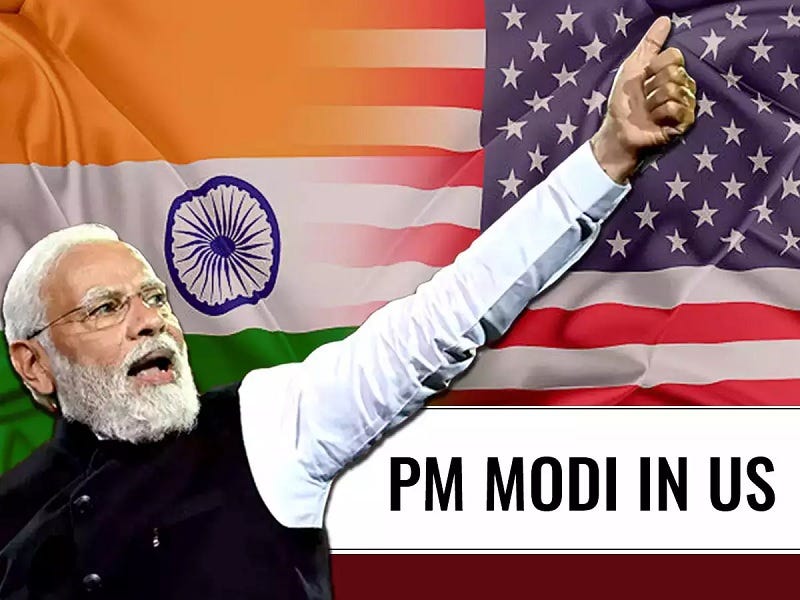There will of course be those who won’t correct their errors of judgement in the face of these objectively existing and easily verifiable facts, but such people either have an agenda in sticking to their script or are incapable of acknowledging “inconvenient information” due to their ideological blinders.
The Alt-Media Community (AMC) speculated that India would dump Russia during Prime Minister Modi’s latest trip to the US, and even RT’s Asia editor Joydeep Sen Gupta wrote afterwards that it represented a “discernible paradigm shift” in their ties. The latter’s assessment was already responded to here, which argued that the Indian leader’s peace remark fully conformed with his country’s multi-alignment policy, but readers should also be made aware of three official facts that contradict his and the AMC’s narrative.
In the White House’s transcript of “Remarks by President Biden and Prime Minister Modi of the Republic of India in Joint Press Conference”, the Indian leader had only this to say with reference to Russia:
“The COVID pandemic and the Ukraine conflict have afflicted the countries of the Global South in particular. We believe that in order to resolve these problems, it is absolutely imperative for all countries to unite. From the very beginning of the events in Ukraine, India has laid emphasis on resolution of dispute through dialogue and diplomacy. We are completely ready to contribute in any way we can to restore peace.”
According to that same site, the “Joint Statement from the United States and India” merely repeated the language that India had earlier agreed to in G20 statements regarding the NATO-Russian proxy war:
“President Biden and Prime Minister Modi expressed their deep concern over the conflict in Ukraine and mourned its terrible and tragic humanitarian consequences.
The leaders underscored the serious and growing impacts of the war on the global economic system, including on food, fuel and energy security, and critical supply chains. They called for greater efforts to mitigate the consequences of the war, especially in the developing world. Both countries further pledge to render continuing humanitarian assistance to the people of Ukraine.
They called for respect for international law, principles of the UN charter, and territorial integrity and sovereignty. Both countries concurred on the importance of post-conflict reconstruction in Ukraine.”
Finally, India’s Press Information Bureau showed that this conflict was only mentioned once in the “Address by Prime Minister, Shri Narendra Modi to the Joint Session of the US Congress”:
“The last few years have seen deeply disruptive developments. With the Ukraine conflict, war has returned to Europe. It is causing great pain in the region. Since it involves major powers, the outcomes are severe. Countries of the Global South have been particularly affected. The global order is based on the respect for the principles of the UN Charter, peaceful resolution of disputes, and respect for sovereignty and territorial integrity.”
As proven by the official transcripts of his three separate statements, nothing that Prime Minister Modi alluded to or said about Russia can be interpreted as unfriendly. In the order that they were shared, India has always: said that it could help mediate between the direct combatants if requested by both to do so; drawn attention to the conflict’s consequences for fellow Global South countries; and regularly reaffirms the importance of the UN Charter.
It’s this last-mentioned point that some critics have relied on to allege that his reference to it implies tacit criticism of Russia, but not only has India consistently abstained from voting against it at the UNGA, President Putin directly addressed that angle during a recent meeting with African leaders. According to the official Kremlin transcript of their talks, he argued that the Donbass Republics had the UN-enshrined right to declare independence, after which Russia supported them in accordance with Article 51.
It's unimportant whether one agrees with his interpretation since the point is that the Russian leader made his country’s case in the context of international law as premised on the principles of the same UN Charter that his Indian counterpart said is sacrosanct. For this reason, it’s inaccurate at best and dishonest at worst to claim that the latter’s reference to that document implies tacit criticism of Russia’s special operation.
Even if someone wanted to still stubbornly insist that it did, then they should know that this wasn’t the first time that India referenced its commitment to the UN Charter when talking about this proxy war. Since then, relations with Russia have comprehensively strengthened and proven their resilience to Western pressure, which discredits the claim that such words are proof that India has supposedly dumped its strategic partner or at the very least distanced itself from it.
There will of course be those who won’t correct their errors of judgement in the face of these objectively existing and easily verifiable facts, but such people either have an agenda in sticking to their script or are incapable of acknowledging “inconvenient information” due to their ideological blinders. Whatever their reason may be, it’s this litmus test that represents a “discernible paradigm shift” since observers can now see for themselves whether or not someone’s analyses about India should be taken seriously.





"...it’s inaccurate at best and dishonest at worst to claim that the latter’s reference to that document implies tacit criticism..."
Fair enough.
But more importantly,
"...India [has] consistently abstained from voting against it at the UNGA..."
"...discredits the claim that such words are proof..."
True, good point.
"...such people either have an agenda..."
Might just be d*cks.